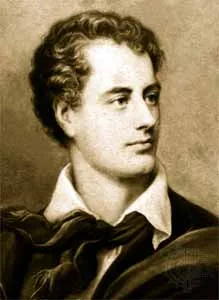Welcome to my Blog,
This blog is created as part of my B.A. studies. This blog is more than a digital journal; it's a dynamic tapestry where ideas, reflections, and the vibrant hues of learning converge.
Lord Byron
Lord Byron, born on January 22, 1788, in London, England, was a prominent British Romantic poet and satirist whose life and works captivated the imagination of Europe. The son of Captain John Byron and Catherine Gordon, Byron inherited the title and estates of his great-uncle at the age of 10, which led to his relocation to England. Growing up with a clubfoot, Byron faced sensitivity to his lameness and developed an extreme sensitivity to it.
Byron's education included time at Harrow, one of England's prestigious schools, where he fell in love with his distant cousin, Mary Chaworth. His first published volume of poetry, "Hours of Idleness," appeared in 1807, drawing both praise and criticism. Byron gained recognition with his retaliation in "English Bards and Scotch Reviewers" in 1809, which marked his entry into the literary scene.
At the age of 21, Byron took his seat in the House of Lords, beginning a grand tour with John Cam Hobhouse. His travels in Portugal, Spain, Albania, and Greece significantly influenced his poetic work, particularly the famous "Childe Harold’s Pilgrimage." Byron's personal life was marked by love affairs and scandal, including relationships with Lady Caroline Lamb and Lady Oxford. In 1815, Byron married Anne Isabella Milbanke, leading to the birth of their daughter Augusta Ada. However, the marriage was doomed, and the couple legally separated in 1816. Byron's life took a turn with his involvement in the Greek War of Independence in 1823. He died in Missolonghi on April 19, 1824, becoming a symbol of disinterested patriotism and a Greek national hero.
Byron's writings, more autobiographical than those of his contemporaries, showcase the paradox of his complex character, blending skepticism, cynicism, melancholy, and satirical wit. His famous works include "Childe Harold’s Pilgrimage" and the unfinished satirical epic "Don Juan." Byron's legacy endures as one of the leading figures of the Romantic era, known for his lyrical achievements, exploration of personal and societal themes, and the enduring impact of his literary contributions.
When We Two Parted
"When We Two Parted" delves into the emotional aftermath of a clandestine love affair. The speaker reflects on the pain and disillusionment experienced when parting ways with a lover, highlighting the secrecy surrounding their relationship and the subsequent feelings of betrayal. The poem provides a glimpse into the speaker's deeply wounded emotions and the lasting impact of the separation.
The poem begins with a vivid portrayal of the breakup, describing it as silent and tearful. The speaker reflects on the physical and emotional coldness experienced during the parting, emphasizing the lasting impact on their lives. The morning dew serves as a metaphor for the emotional chill that foreshadows the speaker's present feelings.
The speaker laments the broken promises and the gossip surrounding the former lover. Mention of the lover's name invokes embarrassment and a sense of mourning, akin to funeral bells ringing in the speaker's ears. The poem explores the profound regret the speaker feels for loving the partner so deeply, with a tinge of bitterness at being misled and forgotten.
The secrecy of their relationship intensifies the speaker's grief, and the poem concludes with a poignant contemplation of a potential future encounter. If the speaker were to meet the former lover again after years, the response would be one of silent greeting and tearful remembrance, underscoring the enduring pain of the parting. "When We Two Parted" masterfully captures the complexities of love, secrecy, and the enduring emotional scars left by a clandestine affair.






No comments:
Post a Comment